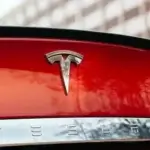Tesla’s stock surged 8% on Friday, propelling the electric vehicle giant’s market capitalization past $1 trillion as investors cheered the recent U.S. election outcome. The week-long rally comes after Donald Trump’s presidential win, sparking optimism among investors that Trump’s policies could favor Tesla and other U.S. manufacturers. The company’s CEO, Elon Musk, has been a strong ally for Trump, reportedly backing his campaign with $130 million.
Tesla’s market value had hovered at $807.1 billion earlier in the week, and Friday’s gains pushed the stock up nearly 29% for the week, marking a sharp reversal from earlier in the year. With the rally, Tesla rejoined the elite club of tech giants valued at $1 trillion or more, alongside companies like Nvidia, Apple, and Microsoft.
Market experts suggest that a Trump-led White House could usher in more favorable conditions for Tesla. Wedbush Securities analyst Dan Ives highlighted Tesla’s competitive position, noting that reduced regulatory pressure and the possibility of new tariffs on Chinese electric vehicles could provide Tesla an advantage in the U.S. market. These tariffs would reduce competition from lower-cost Chinese EV makers like BYD and Nio.
Under the Trump administration, the federal $7,500 EV tax credit could be at risk of repeal, potentially impacting Tesla’s sales. However, Tesla’s robust market presence and industry influence may offset this challenge.
Tesla’s recent quarterly earnings report showed revenue of $25.18 billion, with net income of $2.17 billion. Musk projects the company’s vehicle growth rate could reach between 20% and 30% next year, driven by affordable models and advancements in autonomy.
Musk’s ambitious vision for Tesla includes establishing a federal regulatory framework for autonomous vehicles. During Tesla’s earnings call, Musk emphasized the importance of a national approval process, viewing it as a necessary step to roll out Tesla’s fully autonomous vehicles nationwide. Currently, state-level regulations present a challenge to Tesla’s efforts to offer more than partially automated driving systems, while competitors like Waymo, owned by Alphabet, are already operating robotaxi services in major U.S. cities.
As Tesla pushes forward with autonomy and potential regulatory shifts, the company’s stock momentum reflects high investor expectations for its role in shaping the future of transportation under a supportive administration.





